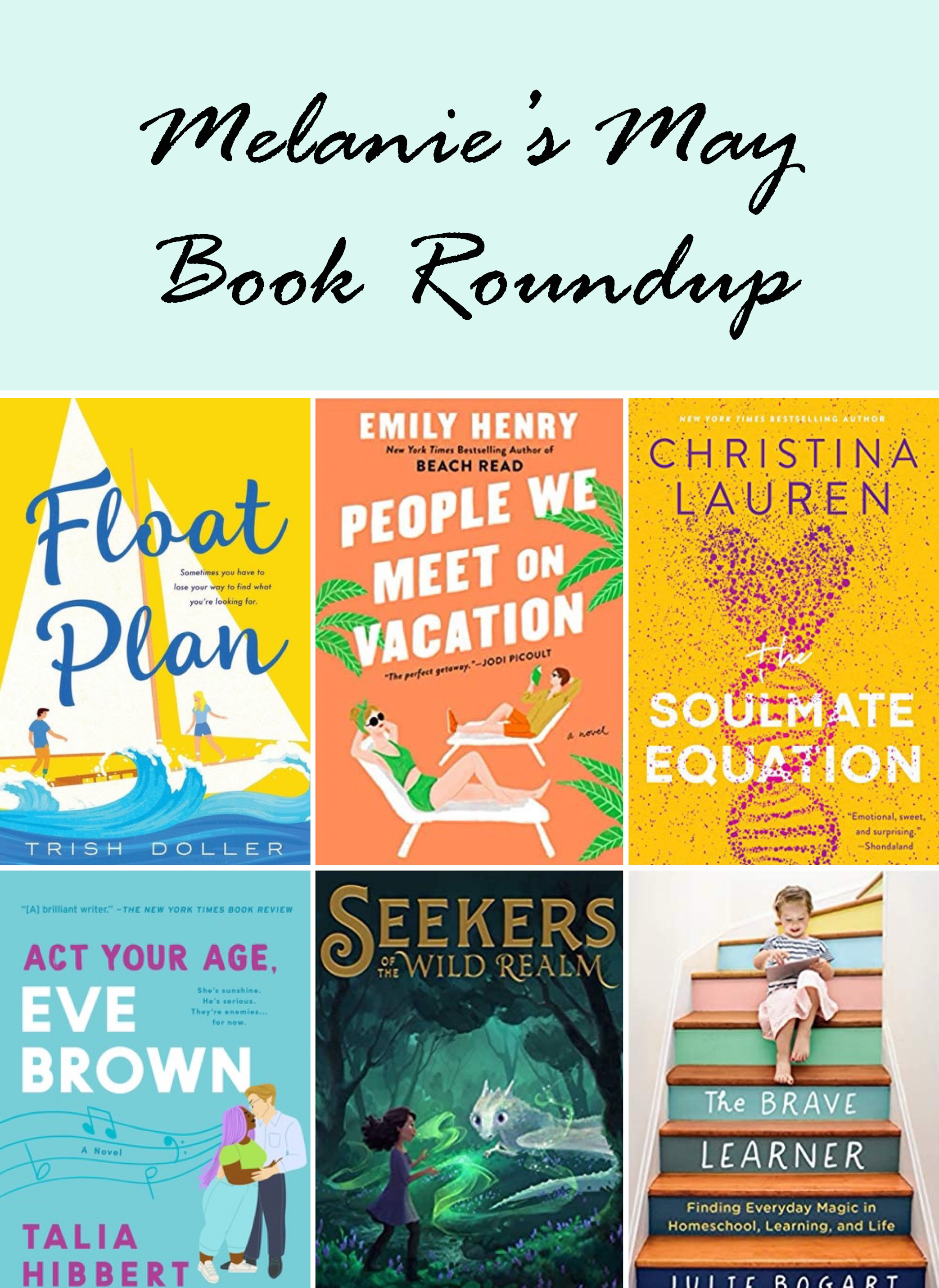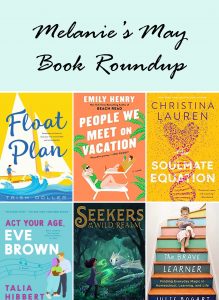
May here in Texas has been rainy with no reprieve on the horizon, but while my kids have gone a little stir crazy, it’s been pretty good for reading books. I read fifteen books, including romance, women’s fiction, a pretty great middle grade fantasy novel, and two nonfiction books about homeschooling. Let’s dive in!
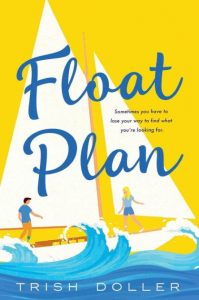
I kicked off the month with a book I’m pretty certain will end up on my Best of 2021 list this December, Float Plan by Trish Doller. Ten months after Anna’s fiancé dies by suicide, she sets out on the sailing trip he planned for them to take through the Caribbean. She struggles through a rough first leg of the trip and realizes she needs to hire a more skilled sailor to help her hit every island stop on Ben’s detailed itinerary. Enter Keane, an expert sailor whose prosthetic leg has limited his opportunities but not his ability on a sailboat. He offers to help Anna for a drop-off later in the trip. (Also, *alert* he’s Irish.)
Okay, so first, be warned there is a suicide note on page one. I was skeptical about how a romance was going to develop from this beginning in a way that felt believable and, frankly, okay. Anna’s grappling with Ben’s suicide is not a minor part of the book, and while I think Doller takes great care in handling the subject matter, the characters do occasionally have thoughts about Ben’s suicide that are realistic and emotional, if not always entirely free from judgment. I don’t read these as authorial judgments, given the sensitivity elsewhere in the writing.
My favorite romances often have a central thread of grief woven through them. What can I say? I’m a sucker for angst. This one explores that range of pain and happiness thoroughly and with acute insights. Anna begins by following Ben’s itinerary to the letter, so it’s no wonder that every mile she sails, she considers what the trip and her life would have been like with him. “The never knowing is lodged in my heart like a stone, a constant dull ache that throbs during moments like these, when I wonder what our future would have been.” But over the course of the trip, she starts to deviate from the plan. She goes places that weren’t on his list and bypasses others entirely and eventually understands “how sadness and happiness can live side by side within a heart, and how that heart can keep on beating.”
The only way I think the romance part of this works is as a slow burn. It’s a very slow burn, and I was glad for it. It’s also one of the few romances I’ve read where I thought the two characters were very well matched and wanted them to make a relationship work while also being entirely okay with them going their separate ways if that was the outcome. A huge portion of the book is centered around Anna’s journey through her grief and toward finding her own way in the world, gaining true competence at sailing and overall self-sufficiency. She needed Keane after that first rough solo journey, but she truly comes into her own, and it’s so empowering to read.
I knew there would be a point when they fought or separated for whatever reason, (spoiler alert, I guess?) as is usually the case, but while that dark moment often reads as loss, depression, pain, and darkness, this book opens up in a truly breathtaking way. I was so moved and so willing to go anywhere Trish Doller wanted to take me, both through her vivid descriptions of the Caribbean and on the emotional ride.
And it looks like she’s adding at least two more books to this fictional world. I can’t wait to see what she writes next.
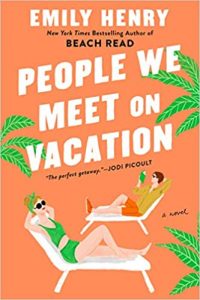
My most-anticipated book of May was Emily Henry’s People We Meet on Vacation. I went in with tempered expectations because I didn’t want my love of Beach Read to make me disappointed by an otherwise great book, and that was a good call. It didn’t push Beach Read out of my favorite spot, but it definitely earns a place in my top reads for this year so far.
Poppy has “Millennial ennui” despite having a great career and her life basically in order (“My life turned out how I hoped it would, and now I just miss wanting something”), and her solution is to repair her decade-old friendship with Alex by going on one of the annual summer trips they used to take before something happened in Croatia two years ago and they stopped talking. The story unfolds with yo-yo-ing timelines, splitting between the current summer and summers past, so we see their friendship grow and change while present-day Alex and Poppy navigate what feels like a point of no return. This trip will likely change everything.
The best part of an Emily Henry book is the crackling banter between her main characters. The things they say to each other, usually funny in the moment, get further mileage as call backs and inside jokes, ones that bond them to each other but also bring the reader in on the dance in a rare, magnetically intimate way that feels a little like falling in love yourself. One such inside joke: on a past trip, a gallery employee tries to sell them a $21,000 bear sculpture they could never afford, arguing that “when art speaks to you, you find a way to make it work,” and after that, the question, “Does it speak to you?” becomes the criteria for every bizarre or embarrassing souvenir they might buy.
But these little jokes also pay emotional mileage. Present-day Poppy worries, “It’s possible that all those little moments that meant so much to me never meant quite the same thing to him. It’s possible that he didn’t reach out to me for two years because, when we stopped speaking, he didn’t lose something precious the way that I did.”
There is also weirdness deeply embedded into the characters, a weirdness that endeared them to me immediately and which gives the book a warm and tender essence. This is a weighted blanket in book form. When Poppy role-plays picking Alex up in a bar, he tells her he doesn’t live around here, and “even if I did, I have a cat with a lot of medical needs that require specialized care. Makes it hard to get out.” This, it turns out, is true. And the cat’s name is Flannery O’Connor, which probably gives you a good glimpse into the academic-minded “study in control” that is Alex Nilsen.
“I love when you get weird,” Poppy tells Alex, speaking for us all. He replies, “You make me weird. I’m not like this with anyone else.” Don’t we all want to be seen as our strangest, most uninhibited selves and loved for it? Don’t we all want to know someone so well that we get a version of them reserved only for us?
This book is swoony as hell is what I’m saying. It speaks to me.
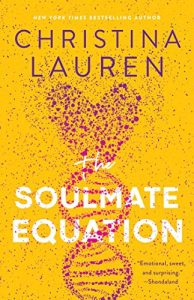
I was saving Christina Lauren’s latest release, The Soulmate Equation, so I’d have a likely solid book to fall back on when needed, but I gave in and read it right at the end of the month. No regrets!
Jess is a freelance statistician and single mom who is starting to feel lonely despite having a charming kid, engaged and loving grandparents, and one of the best friends I’ve seen in a book in a while. Dr. River Pena is a geneticist and CSO for an emerging company, GeneticAlly, which predicts soulmate matches from genetic markers. (I’m summarizing, but it’s real science-y!) Jess finds River uptight and rude, but his sample (it’s just saliva!) gets flagged as a diamond level match with her. The algorithm gives them an unheard of 98% likelihood of lasting happiness together. Despite River’s scientist skepticism, this is his life’s work, so if the algorithm is wrong about him and Jess, it could threaten everything. He and his company’s executive board ask her to spend some time getting to know River, hoping to confirm the findings, and to be available for PR that would use their match to boost the company, which is about to go public.
It’s pretty hard to pull off a modern story that hinges on fate, or in this case, seemingly iron-clad science. What I love about this book is that the characters routinely ask the big questions. If you love someone, but you find out your compatibility rating with them is low, would it change how you feel about the relationship? Or, in Jess and River’s case, does a high number sway you to feel something you otherwise wouldn’t have been open to? How much weight do you give the algorithm, and how much choice is left in the face of something so persuasive?
I love that River identifies right away what Jess’s priorities are, how she operates, and what she needs. When she winds up in a bind and every other person in her orbit can’t step up like usual, he tells her, “I want you to call me for help without an apology on the tip of your tongue.” They are attracted to each other physically, but he marvels at her competence at her job, too. They share a respect for the honesty of good data.
I also love the friendship between Jess and Fizzy, her romance novelist best friend, who mines daily interactions for material and pushes Jess to not feel guilty for wanting just a little bit more for herself beyond her work and her child. She’s the one who convinces Jess to enter her sample into the database in the first place. Their relationship feels just as fated to me as Jess’s relationship with River, unconditional and iron-clad, but also, as becomes important with Jess and River, too, a chosen relationship. I laughed out loud when Jess confesses to Fizzy, “I’m lonely, and I feel like such an asshole complaining, but you’re always going to be a bigger asshole than I am, so I can complain to you.” We all need a Fizzy in our corner.
Instead of writing in-depth about one more book, I want to quickly shout out some other titles I really enjoyed this month.
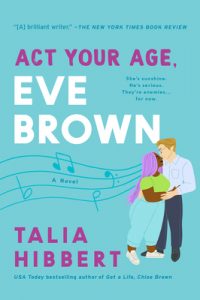
I laughed hard and often at Talia Hibbert’s latest Brown Sisters book, Act Your Age, Eve Brown, and in fact transcribed an entire scene about the invasion of ducks in a pond that ends with the hero exclaiming, “Christ, woman. Read a waterfowl blog!” Someone somewhere needs that tattoo. The gist is that Eve needs a job, and after doing poorly in the interview for a chef position at a B&B, she accidentally hits the potential employer with her car. She winds up working for him and living on the property, and he never stops reminding her that she HIT HIM WITH HER CAR.
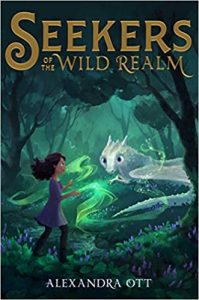
My kids and I also really enjoyed Alexandra Ott’s Seekers of the Wild Realm, which is a middle grade book about a girl who wants to be her village’s first female seeker and a boy who trades her the training she’s been excluded from in exchange for her help with a baby dragon he’s not supposed to have. There are dragons, magic, and beautiful friendships – and no super scary parts for sensitive hearts. The next book will be out in a couple weeks, and we’ll definitely be reading that one, too. We are currently reading her other series, Rules for Thieves.
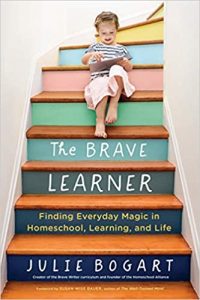
And finally, I’ve seen Julie Bogart’s The Brave Learner recommended all over the place in homeschooling circles, and I finally got my hands on a copy. Whether you homeschool or teach children in a more formal setting or are a parent whose kids are educated primarily outside the home, this book is so valuable! We often say that we want our children to love learning, but Bogart interrogates that claim early on in the book and argues, “When adults ask kids to love learning, they’re asking children to find academics pleasurable so that adults will be relieved of the obligation to nag.” What we really want, usually, is for our kids to joyfully cooperate with what we have already planned for them. But education isn’t something we should do to our kids. Bogart gives practical tips for fostering that elusive love of learning by meeting kids in their own interests, letting “way lead to way,” and inviting them in with mystery, surprise, enchantment, and more. I recommend it whole-heartedly.
On to June!
